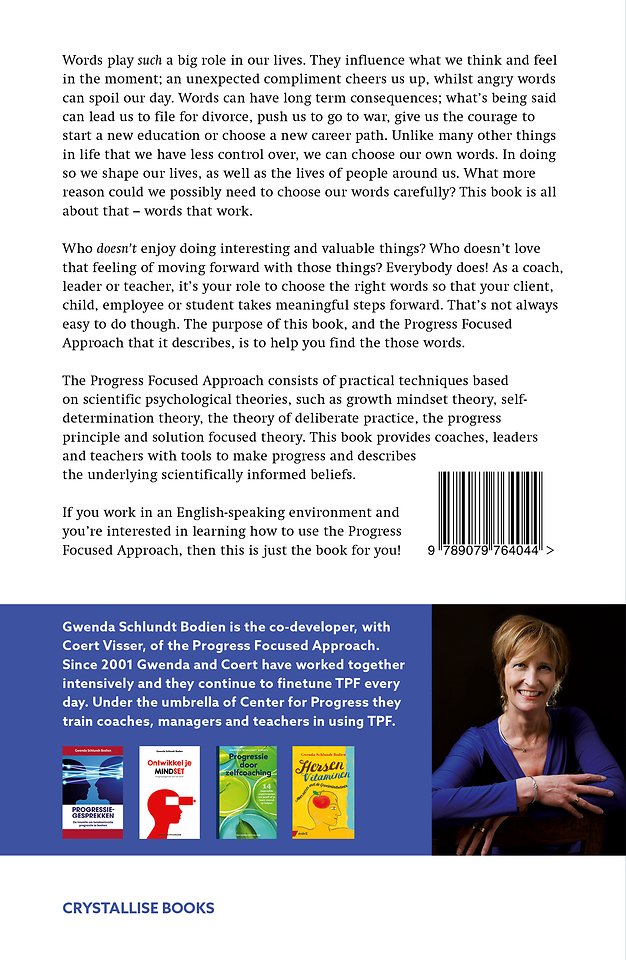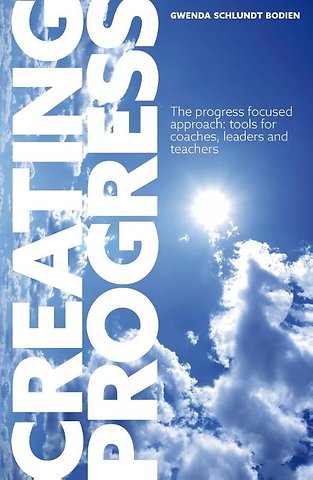



Gwenda Schlundt Bodien is zelfstandig gevestigd trainer, coach en auteur vanuit Bureau voor Oplossingsgericht Werken.
Meer over Gwenda Schlundt BodienCreating Progress
The Progress Focused Approach: tools for coaches, leaders, and teachers
Paperback Engels 2018 1e druk 9789079764044Samenvatting
Words play such a big role in our lives. They influence what we think and feel in the moment; an unexpected compliment cheers us up, whilst angry words can spoil our day. Words can have long term consequences; what’s being said can lead us to file for divorce, push us to go to war, give us the courage to start a new education or choose a new career path.
Unlike many other things in life that we have less control over, we can choose our own words. In doing so we shape our lives, as well as the lives of people around us. What more reason could we possibly need to choose our words carefully? This book is all about that – words that work.
Who doesn’t enjoy doing interesting and valuable things? Who doesn’t love that feeling of moving forward with those things? Everybody does! As a coach, leader or teacher, it’s your role to choose the right words so that your client, child, employee or student takes meaningful steps forward. That’s not always easy to do though. The purpose of this book, and the Progress Focused Approach that it describes, is to help you find the those words.
The Progress Focused Approach consists of practical techniques based on scientific psychological theories, such as growth mindset theory, self-determination theory, the theory of deliberate practice, the progress principle and solution focused theory. This book provides coaches, leaders and teachers with tools to make progress and describes the underlying scientifically informed beliefs.
If you work in an English-speaking environment and you’re interested in learning how to use the Progress Focused Approach, then this is just the book for you!
Trefwoorden
Specificaties
Lezersrecensies
Inhoudsopgave
1. What would you say? 12
2. Eight beliefs about progress 15
What is TPF 15
Belief 1. Believing progress is possible has a strong impact on actually improving 17
Belief 2. Personality, intelligence and capacities can and do change 24
Belief 3. Deliberate practice underlies expert performance 31
Belief 4. Autonomous motivation leads to high quality progress 36
Belief 5. People are resilient and there are many pathways to progress 42
Belief 6. It is possible to define what meaningful progress entails 47
Belief 7. Making small meaningful progress is the most powerful motivator 56
Belief 8. A progress focused interaction enhances meaningful progress 62
3. Twenty progress focused interventions 73
1. Usefulness interventions 73
2. Progress focused acknowledgement 75
3. Normalising 76
4. Positive expectation intervention 77
5. Three interconnected growth mindset interventions 78
6. Not-yet intervention 79
7. Reframing 80
8. Direct process compliments 80
9. Indirect process compliments 82
10. Redirecting 82
11. Positive behaviour interventions 83
12. Implementation intentions 84
13. How does it bother you-question 85
14. Previous successes question 86
15. Desired progress scale 86
16. Process scale 88
17. Optimism question 88
18. Continuation question 89
19. Mutualising interventions 89
20. Circle technique 90
4. Coaching towards progress 94
Leading from behind 94
The CPW-seven-step-approach 96
Step 1. Asking what would be useful to the client to talk about 98
Step 2. Clarifying the desire for improvement 99
Step 3. Defining the desired progress 101
Step 4. Determining the achieved progress 104
Step 5. Analysing progress in the past 108
Step 6. Choosing one step forward 112
Step 7. Asking if the conversation was useful to the client 114
The next session 115
When is a good time to go to the next step? 117
Involuntary clients 120
Giving advice 124
Coaching dialogue 126
5. Leading towards progress 135
Creating conditions for progress 136
Do’s and don’ts 139
Progress focused directing 143
Directing Interaction Flow Chart 149
Instructing 153
Why performance appraisal backfires 156
Progress Conversations 157
Plan-and-implement 164
Test-and-learn 165
Influencing autonomous intentions in organisational change 166
Three criteria to guide the creation of policies 168
6. Teaching towards progress 172
It’s for your own good 172
Obligatory? 174
The motivation of the teacher 175
Motivation in the classroom: do’s and don’ts 176
Mindset in the classroom: do’s and don’ts 178
Preparing the lesson 184
The lesson itself 188
Deliberate practice in the classroom 189
Reflecting on the lesson 194
Mentoring 199
Back to Oliver 203
7. What would you say? 209
Checklist progress focused interventions 212
Summary of the CPW seven steps approach 220
Summary: progress focused helping 221
Summary: progress focused directing 222
Summary: progress focused training 223
Summary: progress focused instructing 224
Index 226
Vergelijkbare boeken
Anderen die dit boek kochten, kochten ook
Rubrieken
- advisering
- algemeen management
- coaching en trainen
- communicatie en media
- economie
- financieel management
- inkoop en logistiek
- internet en social media
- it-management / ict
- juridisch
- leiderschap
- marketing
- mens en maatschappij
- non-profit
- ondernemen
- organisatiekunde
- personal finance
- personeelsmanagement
- persoonlijke effectiviteit
- projectmanagement
- psychologie
- reclame en verkoop
- strategisch management
- verandermanagement
- werk en loopbaan











